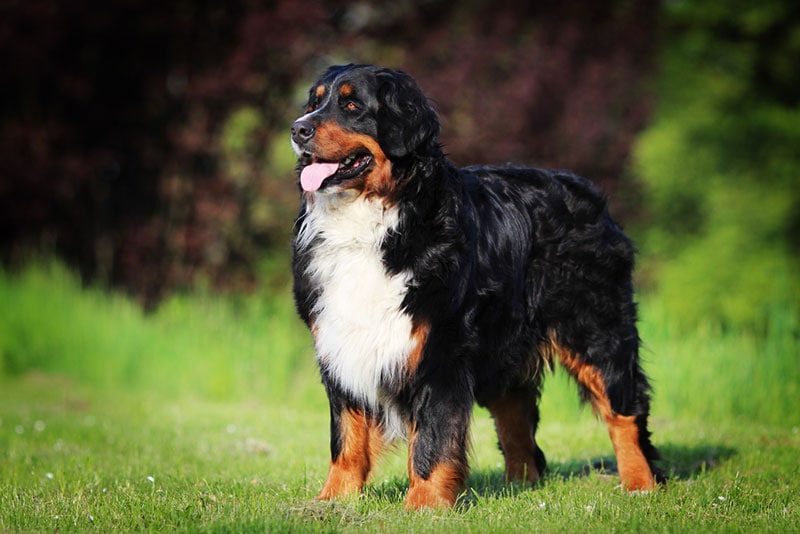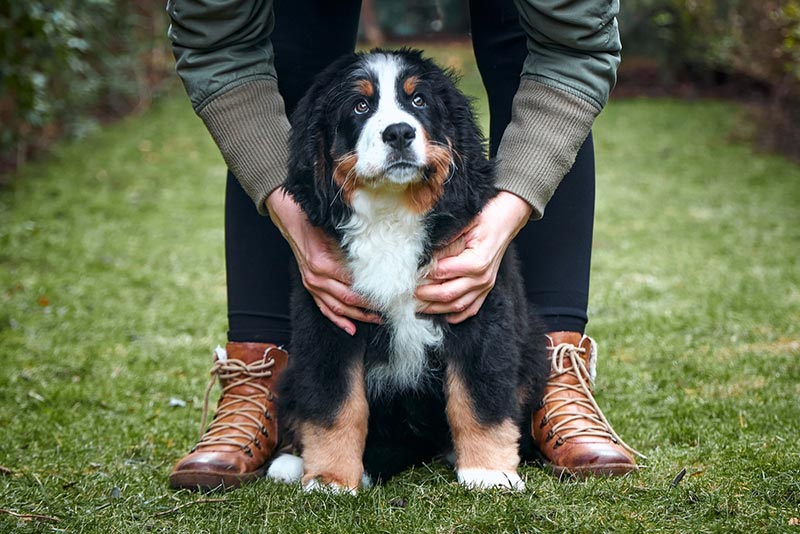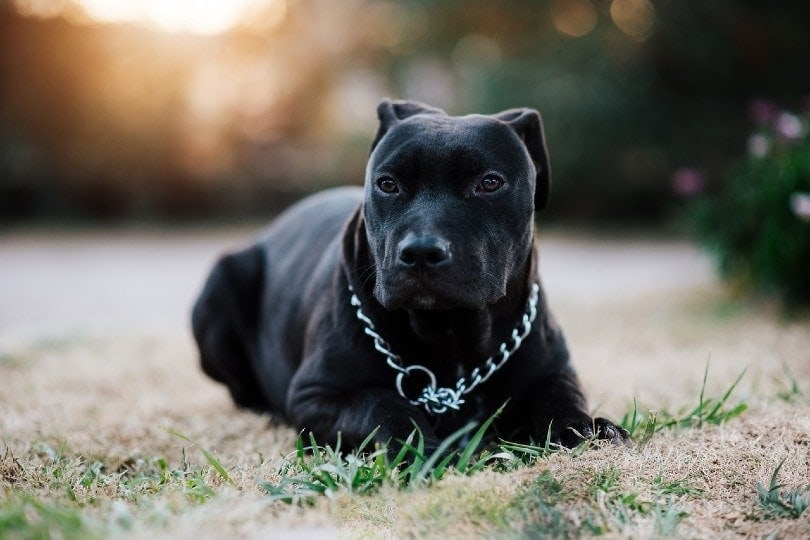How Long Do Bernese Mountain Dogs Live? Average Lifespan, Data & Care

Updated on

Click to Skip Ahead
The Bernese Mountain Dog belongs to the Sennenhund-type of dogs that trace their origin to Bern, Switzerland. They are a large, heavy, and highly muscular breed featuring a tri-colored double coat and black eyes. This breed loves being around the family and enjoys snuggling and playing with kids. Being a former working dog, it enjoys energy-demanding family outdoor activities such as hiking.
But amid the joy and excitement of owning a Bernese Mountain Dog is the concern about its short lifespan. The average lifespan of a Bernese Mountain Dog is 8 to 9 years. In this article, we will explore in detail how long Bernese Mountain can live and what you can do to ensure yours lives longer.
What’s the Average Lifespan of a Bernese Mountain Dog?
The average lifespan of a Bernese Mountain is 8 to 9 years. This is shorter than other breeds of similar sizes, such as German Shepherd and Flat-Coated Retriever. On average, large dog breeds live for 10 to 13 years.1

Why Do Some Bernese Mountain Dogs Live Longer Than Others?
Despite the short average lifespan, a Bernese Mountain Dog can live longer. One particular dog lived for 15 years and two months, according to a UK report that surveyed the health of 629 Bernese Mountain Dogs.2
But why do some Bernese Mountain Dogs live longer than others? Well, it is often a combination of various factors.
1. Nutrition
What your dog eats will impact its health and overall lifespan. It needs high-quality food to provide adequate energy and avoid any nutrition-related illnesses.
It is advisable to consult with a veterinarian on what appropriate foods to feed your dog. Generally, it should be a complete and balanced diet with ingredients such as meat, whole grains, vegetables, and fruits.
Avoid table scraps, cheap food, and many treats. These can make the dog overweight, risk their health, and shorten their lifespan.
The amount you feed your dog should depend on activity level, age, and size. And you should constantly monitor its weight to make appropriate adjustments. One straightforward method you can try is checking their ribs. The dog has a healthy weight if you can feel the ribs but can’t see them.

2. Environment and Conditions
The type of environment and conditions a Bernese Mountain Dog lives in can significantly impact its health and lifespan. That includes its immediate surrounding and the larger geographical region.
This breed does well in cold regions because it has adapted to survive in harsh cold weather—the undercoat insulates them from the cold, and the top coat absorbs sunlight. It is a perfect choice breed for those who love the snow.
Conversely, the canine can’t tolerate too much heat and could die of heat stroke. It is not surprising to see it seeking shade on a warm day.
The dog’s immediate surroundings are also essential to its survival. Case in point, keeping the kennel clean is imperative. So, ensure you don’t leave feces and urine to linger on the floor for long to minimize the risk of illnesses such as fungal infection.
3. Enclosure Size/Living Quarters/Housing
The Bernese Mountain dog is a working breed with a lot of energy. It requires daily exercise to stay healthy and strong.
Therefore, the breed is unfit to live in a small, enclosed space with limited movement. Instead, it needs a stimulating environment to burn off its energy.
It is not a must that you live on a farm. But at least ensure your home has enough space for the dog to run, play, and train. Spending time outside will promote its health and extend its lifespan.

4. Size
Size matters as far as a dog’s lifespan is concerned. Smaller breeds usually have a longer lifespan. Giant breeds live the shortest, dying at 6 to 8 years, while small dogs can live as long as 12 to 14 years.
According to a German study, large breeds of dogs are more likely to die from cancer than small breeds. The reason is unknown, but researchers speculate the fast growth rate has something to do with it.
5. Sex
Female dogs tend to live longer than their male counterparts. And such is the case with Bernese Mountain Dogs. The females have an 8.8-year median survival, while the median life expectancy for males is 7.7 years.

6. Genes
Genes have a significant role to play in the lifespan of a Bernese Mountain Dog. For instance, the offspring can inherit an illness their parents had.
One of the most common hereditary diseases for Bernese Mountain Dogs is cancer. Others include arthritis and renal injury.
7. Breeding History
A dog with many surviving relatives is less likely to have predispositions for common diseases. Therefore, understanding the breeding history is imperative when buying a Bernese Mountain Dog puppy.
Don’t pick just any breeder. Ensure you ask about the dog’s history first. How long did the parents or grandparents live? What was the cause of death? Walk away if the breeder is unable to answer your questions satisfactorily. That is usually a sign that they don’t take much interest in such matters. You should also avoid breeders who don’t conduct regular testing.

8. Healthcare
Neglecting the healthcare of a Bernese Mountain Dog will increase its chances of contracting an illness, thus shortening its lifespan. As such, ensure you visit a veterinarian for routine checkups to detect ailments early before they become fatal.
Being on the lookout for changes in the dog’s physical demeanor and temperament is also imperative. Learning the symptoms of the diseases causing the highest deaths in Bernese Mountain Dogs can help.
The 4 Life Stages of a Bernese Mountain Dog
A Bernese Mountain Dog goes through four major life stages. Learning them can help you understand your dog’s behavior better and enable you to estimate how many years it has left to live.
1. Puppy
Besides being comparable to the size of a football, puppies are curious and active. It is the best stage of life to conduct obedience training since the puppies usually interact freely with human beings.
2. Adolescent
Unlike puppies, adolescent Bernese Mountain Dogs are more reserved and may seem unfriendly. But they are only trying to make sense of the world around them.
They usually experience rapid growth at this stage and can grow to the length and height of an adult. However, they are skinnier.

3. Adult
Adult Bernese Mountain Dogs are calmer and surer of themselves in social situations. Also, they are loving and always ready to defend family members.
4. Senior
Senior Bernese Mountain Dogs are five to eight years old. They tend to move slowly at this stage and are also less bothered about their surroundings.
Your dog will start to show signs of illness as it approaches its sunset years. So, look out for symptoms of arthritis and lethargy.

How to Tell Your Bernese Mountain Dog’s Age
Learning about the different life stages of a Bernese Mountain dog can give you a rough idea of its age. For instance, a dog with much confidence and independence is probably in the adult stage.
However, the surest way to know the age of your Bernese Mountain dog is to consult your local veterinarian. They will conduct the necessary tests and evaluations to give you a more accurate prediction.
Conclusion
The Bernese Mountain Dog is a high-energy dog that can bring joy and excitement to your entire family. However, it usually does not live very long.
Taking good care of the dog right from its puppy stage is imperative. You can prolong its life by providing proper nutrition, keeping the environment clean, availing enough space for exercise, and looking after its health.
Featured Image Credit: Hebi B., Pixabay











